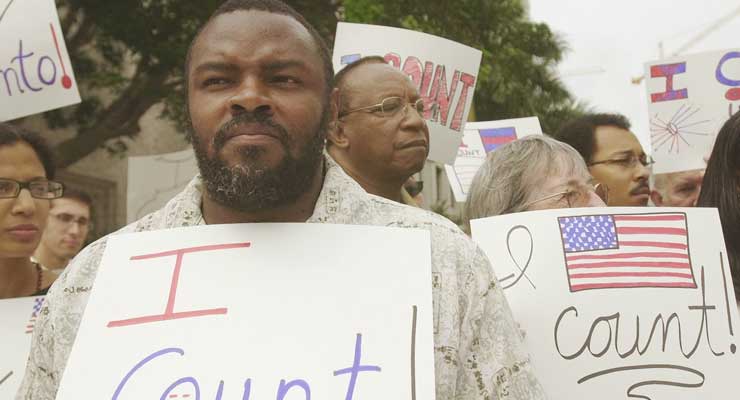
The restoration of Kentucky felon voting rights is a major win for democracy in red state
From the Brennan Center:
Kentucky Gov. Steve Beshear issued an executive order today that will make it possible for more than 170,000 Kentucky citizens with past criminal convictions to get back their right to vote — an estimated 140,000 are immediately eligible to have their rights restored and another 30,000 will be over time. The announcement is an incredible breakthrough in the movement to end criminal disenfranchisement policies nationwide.
Kentucky was one of only three states — along with Florida and Iowa — to permanently bar citizens with past convictions from voting. But its constitution does grant the governor broad authority to restore voting rights. Today’s action moves the state closer to the mainstream than any Kentucky governor has before.
Beshear’s order makes rights restoration available for citizens who fully complete their sentences and were disenfranchised because of non-violent convictions. Citizens currently serving sentences will get a certificate of rights restoration and a voter registration application in the mail when they complete their sentence and get their discharge papers. Those who already have completed sentences will be able to contact the state to initiate that same process. Before today, all citizens with felony convictions had no hope for rights restoration unless they could personally persuade the governor to restore rights to them individually. And under a previous governor, Kentucky citizens once had to submit an essay with three character references when applying to receive their right to vote back.
The figures used to assess the order’s impact were estimated using data from several sources, including the 2010 U.S. Census, the Sentencing Project’s estimates of disenfranchised populations, and federal Bureau of Justice Statistics data of the proportion of individuals on parole and probation with felony convictions classified as non-violent or otherwise.
A broad coalition — which has worked for years to end lifetime disenfranchisement in Kentucky — praised the governor’s actions as a breakthrough. That effort has included the Brennan Center for Justice and other supporters, including Kentuckians for the Commonwealth, the Catholic Conference of Kentucky, the ACLU of Kentucky, the Kentucky Council of Churches, and the Kentucky State Conference of the NAACP. In 2014, both houses of the state legislature passed legislation that would allow the public to vote on ending lifetime disenfranchisement in Kentucky’s constitution, but they could not agree on a final bill. The legislature has considered similar measures for the past decade.
“Today’s order will offer a second chance to thousands and thousands of Kentucky citizens, some of whom have waited decades for the chance to get their right to vote back,” said Myrna Pérez, director of the Voting Rights & Elections Project at the Brennan Center for Justice at NYU School of Law. “Americans from all walks of life know that our criminal justice system is broken. Governor Beshear’s leadership is a move in the right direction.”
“We’re seeing growing national momentum for rights restoration, and Kentucky is the latest place to join in on that trend,” said Brennan Center Counsel Tomas Lopez. “Restoring the right to vote will improve Kentucky’s democracy, strengthen its communities, and increase public safety. We hope the state will build on today’s reforms and make the right to vote accessible to all Kentucky citizens living and working in their communities.”
Kentucky’s policy change builds on recent bipartisan support for rights restoration around the country. Last year, U.S. Attorney General Eric Holder called on states to restore voting rights. Supporters from across the political spectrum have introduced bills in Congress, including the Civil Rights Voting Restoration Act of 2015 from U.S. Sen. Rand Paul (R-Ky.) and the Democracy Restoration Act from U.S. Sen. Ben Cardin (D-Md.) and U.S. Rep. John Conyers (D-Mich.).
Over the past two decades, more than 20 states have improved their criminal disenfranchisement laws to allow more people with past convictions to vote, to vote sooner, or to access that right more easily. Like similar laws elsewhere in the United States, Kentucky’s policy disproportionately impacts racial minorities. It is estimated that 1 in 5 African Americans in Kentucky are disenfranchised, compared to 1 in 13 nationally. After today’s action, only Florida and Iowa permanently disenfranchise all citizens with felony convictions.
Individuals who have already completed their sentences and believe they may be eligible for voting rights restoration under the new policy should visit the Brennan Center’s Kentucky information page, which will be updated with a link to the state government’s rights restoration website. The state website will include details on eligibility and how to initiate the rights restoration process.
Leave a Reply